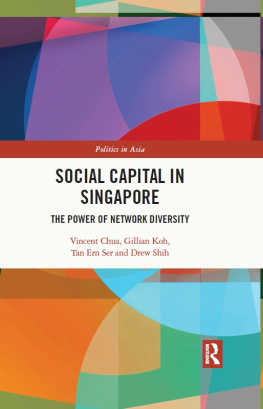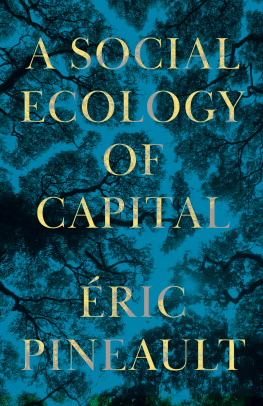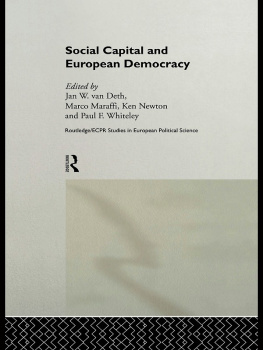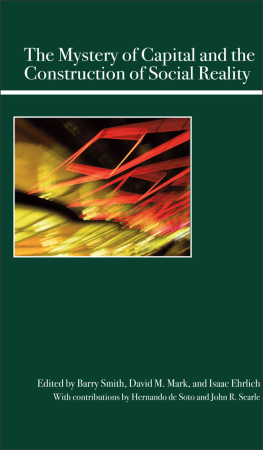
Creation and Returns of Social Capital
An important new contribution to the social sciences is the idea of social capital. Social capital consists of the resources that are embedded within peoples social networks. Validated by empirical research, this book presents social capital research as an integrated theoretical research program.
The core of the program consists of two hypotheses. The social capital hypothesis holds that those with better social capital are better able to realize their ends. And, according to the investment hypothesis people invest in ties to the degree that these are instrumental in achieving their ends.
The volume is organized into six parts, each addressing a fundamental issue in the research program. First, the research program is described. The second part presents the distribution of social capital among citizens of different societies using large-scale social surveys. In the third part experimental and simulation studies show how social capital is created. The fourth part analyzes various returns of social capital such as educational and occupational attainment and performance at work. The fifth issue is how social capital should be measured in a more standardized way. And finally the new issue of social capital as a collective good is explored.
Bringing together the work of a distinguished range of international contributors, this book explores the idea of social capital from a range of disciplinary perspectives and research methods and will be of essential interest to students and researchers of sociology.
Henk Flap is Professor of Sociology at the Department of Sociology, Utrecht University and the ICS, the Netherlands. He works on the development of social capital theory and testing it in various organizational and institutional contexts. Another research interest is the persecution of the Jews during World War II.
Beate Vlker is Associate Professor at the Department of Sociology, Utrecht University and the ICS, the Netherlands. Her main research interests are the contextual conditions of social networks and the returns of social capital.
Routledge Advances in Sociology
This series aims to present cutting-edge developments and debates within the field of sociology. It will provide a broad range of case studies and the latest theoretical perspectives, while covering a variety of topics, theories and issues from around the world. It is not confined to any particular school of thought.
1 Virtual Globalization
Virtual spaces/tourist spaces
Edited by David Holmes
2 The Criminal Spectre in Law, Literature and Aesthetics
Peter Hutchings
3 Immigrants and National Identity in Europe
Anna Triandafyllidou
4 Constructing Risk and Safety in Technological Practice
Edited by Jane Summerton and Boel Berner
5 Europeanisation, National Identities and Migration
Changes in boundary constructions between Western and Eastern Europe
Willfried Spohn and Anna Triandafyllidou
6 Language, Identity and Conflict
A comparative study of language in ethnic conflict in Europe and Eurasia
Diarmait Mac Giolla Chrost
7 Immigrant Life in the U.S.
Multidisciplinary perspectives
Edited by Donna R.Gabaccia and Colin Wayne Leach
8 Rave Culture and Religion
Edited by Graham St. John
9 Creation and Returns of Social Capital
A new research program
Edited by Henk Flap and Beate Vlker
10 Self-Care
Embodiment, autonomy and the shaping of health consciousness
Christopher Ziguras
11 Mechanisms of Cooperation
Werner Raub and Jeroen Weesie
Creation and Returns of Social Capital
A new research program
Edited by Henk Flap and Beate Vlker
LONDON AND NEW YORK
First published 2004
by Routledge
11 New Fetter Lane, London EC4P 4EE
Simultaneously published in the USA and Canada
by Routledge
29 West 35th Street, New York, NY 10001
Routledge is an imprint of the Taylor & Francis Group
This edition published in the Taylor & Francis e-Library, 2005.
To purchase your own copy of this or any of Taylor & Francis or Routledges collection of thousands of eBooks please go to www.eBookstore.tandf.co.uk.
2004 Editorial matter and selection, Henk Flap and Beate Vlker; individual chapters, the contributors
All rights reserved. No part of this book may be reprinted or reproduced or utilized in any form or by any electronic, mechanical, or other means, now known or hereafter invented, including photocopying and recording, or in any information storage or retrieval system, without permission in writing from the publishers.
British Library Cataloguing in Publication Data
A catalogue record for this book is available from the British Library
Library of Congress Cataloging in Publication Data
A catalog record for this book has been requested
ISBN 0-203-64364-X Master e-book ISBN
ISBN 0-203-67043-4 (Adobe eReader Format)
ISBN 0-415-30059-2 (Print Edition)
Figures
2.1 The election survey item
Tables
Notes on the contributors
Phillip Bonacich is a professor of sociology at the University of California, Los Angeles. His interests are in mathematical approaches to social psychology and social networks. Email: .
Alain Degenne is a sociologist and senior researcher at the French National Scientific Research Center (CNRS) in LASMAS/CNRS. His research topics are: labor market, lifestyles, and social networks. Together with Michel Fors he wrote Introducing Social Networks, published by Sage in 1999. Email: .
Anne Bert Dijkstra conducted the research for this contribution as part of his appointment as senior researcher at the Department of Sociology and the Interuniversity Center for Social Science Theory and Methodology (ICS), at the University of Groningen, Netherlands. Email: .
Bonnie Erickson was born in Vancouver, Canada, and educated at the University of British Columbia and Harvard. She has been a member of the Department of Sociology, University of Toronto, since 1973. Her interests include network analysis and hapkido. Email: .
Henk Flap is professor of sociology at the Department of Sociology, Utrecht University and the ICS, Netherlands. He works on the development of social capital theory and testing it in various organizational and institutional contexts. Another research interest is the persecution of the Jews during World War II. Email: .
Michel Fors is senior research director at the French National Scientific Research Center (CNRS). His current interests are in the fields of macrosocial change, social networks, and social justice. Among several books, let us quote Introducing Social Networks, published in 1999 (London, Sage) with Alain Degenne. Email: .
Ove Frank is professor of statistics at Stockholm University. He received his Ph.D. in 1971 for the thesis Statistical Inference in Graphs, and he is a pioneer in the development of statistical models and methods for social network data. He has published extensively on network sampling and data analysis. Email: .








